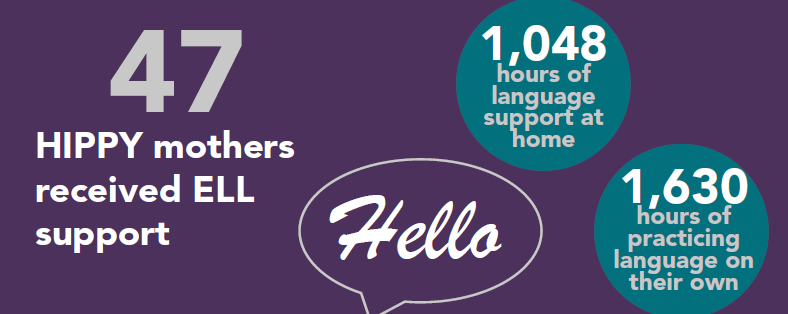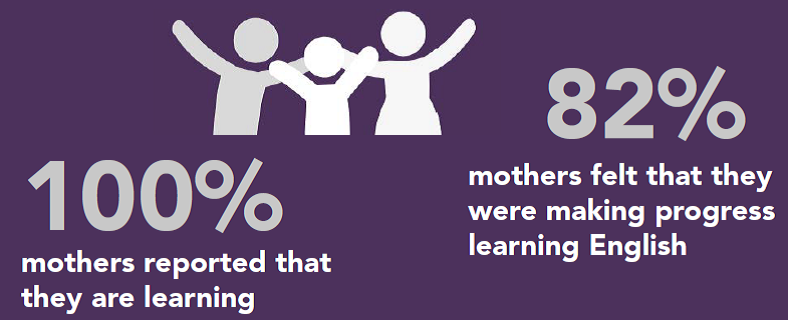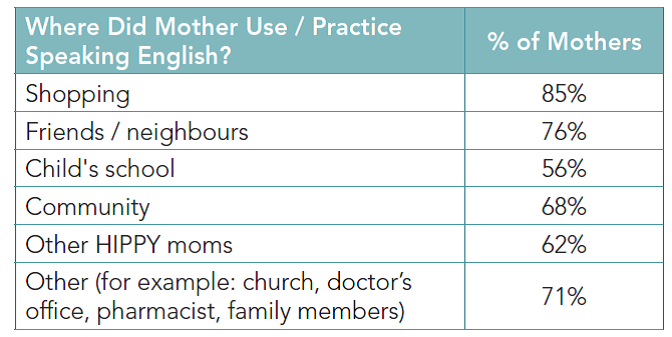The HIPPY ELL Curriculum
We are pleased to welcome Yusra Qadir, the Director of Innovations, Advocacy and Multicultural HIPPY for the Mothers Matter Centre, as our guest blogger. Today she’s describing the HIPPY ELL Curriculum, an English language learning program for adults. While this curriculum was developed to accompany the HIPPY family literacy program, it can also be used as a stand-alone program.
One of the main barriers to effective and timely settlement of newcomers is language. A lot depends on language proficiency – employment, support group formation, ability to engage at community level, accessing basic services and day to day tasks, like taking transit or getting groceries. Not everyone can get rapid access to LINC programs.
The Mothers Matter Centre implemented an “Early Language Learning” (ELL) project funded by IRCC from 2018 to 2020. Its purpose was to develop an easy to use, practical yet comprehensive English language learning curriculum which can help adults from literacy to CLB level 3 to advance their language skills. It covers 12 key settlement topics. Newcomers work toward informal skill-using tasks, build confidence, learn about key resources in the community, and break the cycle of isolation surrounding immigrants and refugees with low levels of English. It increases their readiness for structured LINC learning when their personal circumstances allow.
The Pilot Study
The project was piloted in Vancouver (by ISS of BC) and in Toronto (by Working Women’s Community Centre). It was offered to refugee and newcomer mothers to support building their English language skills and to facilitate and expedite their settlement in Canada. The project facilitated adding on English language learning support to Mothers Matter Centre’s flagship program HIPPY (Home Instruction For Parents of Preschool Youngsters).
The curriculum was delivered through a blended approach, i.e. home visits and weekly group classes. The ELL class provided mothers with an opportunity for collective learning through practicing language skills in a comfortable group setting while the home visit reinforced the learning from the class and ensured mothers were learning even if a class was missed. The home visit was scheduled weekly and had a 30-minute window dedicated to language learning while two 2-hour classes were conducted each week for the mothers.

A total of 47 parents received support through the pilot study. The program enabled 1,048 hours of language support at home through home visits and 1,630 hours of language practising by mothers on their own.

All of the mothers reported learning from the program and 82% felt that they were making progress in learning English.
Mothers reported using English language skills gained through the ELL program in a variety of settings including shopping, interacting with child’s school, with community and with friends, neighbors and other HIPPY moms. (see table below).

Data shows that mothers consistently increased their English language skills; most notably home visitors’ observations of better reading skills increased from 34% in week 6 to 72% in week 18, and better writing skills increase from 19% in week 6 to 68% in week 18.
The HIPPY ELL Program
The Early Language Learning curriculum consists of 12 units:
- Canadian Culture – Small Talk and Social Behaviour
- Community and Settlement/Legal Services
- Child’s Education
- Physical Health
- Mental Health and Self Care
- Transportation and Knowing the Community
- Parenting
- Canadian Rights and Responsibilities
- Emergency and Safety
- Food and Nutrition
- Financial Literacy
- Employment and Volunteering
The curriculum also includes an Instructor’s Manual and a Guide for Home Visitors.
Language learning materials are divided into 3 documents for each unit: Instructor Guidelines, Home Visitor Scripts, and Learner Handouts for use with the scripts.
Each script provides detailed instructional language to be used by the support provider so that the tutoring can be delivered successfully even if the support provider has no teacher training or needs to work on their English themselves. Through the scripts, learners work on speaking skills through dialogues, or practice listening comprehension or grammar. Because of how they are written, the ELL scripts or even the learner handouts alone could be used by volunteers either as the basis of a conversation circle, or for small-group or one-on-one tutoring. There are 144 different scripts to choose from, so there is a lot of material to meet any group of learners’ needs.
The Early Language Learning curriculum is similar to LINC in several respects:
- includes real-world task-based learning
- provides a settlement language focus for community interaction
- is aligned to Canadian language benchmarks
- uses a communicative and interactive classroom approach
- considers client input to learning through intake and monthly needs assessments
- builds client autonomy for learning through reflections and action-oriented feedback
However, unlike LINC, PBLA is not used in ELL. Instead, the ELL curriculum emphasizes improvement over achievement. Learners work toward language tasks in class, then complete skill-using tasks to show themselves and their teacher what they can do. The focus is on building on whatever language the newcomers already have, so they feel successful.
The ELL curriculum contains enough material to support a minimum of 60 weeks of delivery over 2 years.
Each of the 12 units in ELL contain 4 developed real-world skill-using tasks. If an ELL program is run at only 4 hours per week as it was during the pilot, only one or at the most two skill-using tasks could be worked toward per unit. However, the ELL curriculum is flexible enough to support whatever number of weeks and number of hours per week is needed to meet the needs of the students.
The ELL project has concluded but the curriculum is available and can be used as a standalone program for facilitating formal and informal English language learning settings. The curriculum is free to use and The Mothers Matter Centre is keen to support organizations in using it.
To access the Early Language Learning curriculum, email Yusra Qadir at yqadir@hippycanada.ca
Related Blog Posts
COVID-19 Parenting Tip Sheets
Recognizing the challenges that physical distancing and school closures can create for parents, a team of parenting experts has developed a set of six tip sheets on positive parenting. The …
Read On Canada!
Today marks the start of #ReadOnCanada, an exciting new initiative from reading advocates and @FoodBanksCanada to put more than 130K books in the hands of kids this summer, and share …
Teaching Time
Read about resources to help children learn about the passage of time.
